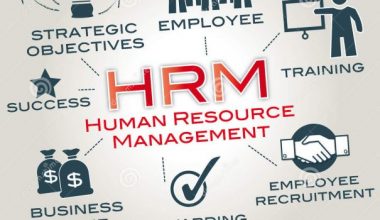Human resources (HR) oversees all aspects of an employee’s employment, from application to exit, including hiring, onboarding, training, performance management, benefits administration, salary, and termination. To effectively manage worker labor, company policy, and regulatory compliance, businesses of all sizes require a strong human resources department. Human resources (HR) is responsible for overseeing the whole employee lifecycle, from the time a candidate applies for a job until the time they leave the organization. In this piece, we explain all you need to know about Human Resources, their department, HR management strategy, and salary. We also discuss briefly Outsourcing in Human Resources.
What is Human Resources?
Human resources (HR) is a department in an organization responsible for looking after the happiness and productivity of a company’s most valuable asset: its workers. Human resources are part of an organization that deals with things like hiring, firing, employee relations, and culture. This group oversees the entire employee life cycle, from selection to termination, and everything in between, including training, skill development, implementing policies and compensation, payroll administration, government regulation, compliance with law, and safety.
Human resources experts contribute to the organization’s performance by establishing rules and procedures that boost efficiency and output. So that managers can concentrate on running the department, HR staff work as partners with them to handle employee concerns and supply necessary support and resources. A career in human resources can provide personal and professional satisfaction.
In today’s dynamic business climate, where top talent is in high demand, a human resources department plays a crucial role in assisting organizations in meeting these challenges.
Understanding Human Resources (HR)
No matter the size of a company, human resources is a necessary component. Generally, its mission is to provide the highest levels of efficiency and security within the company’s personnel.
Compensation and benefits, hiring, retaining, firing, and staying current on any regulations that may have an impact on the business and its employees are all part of HR’s responsibilities.
Human Resources Duties
Human resources are responsible for a wide range of tasks, including hiring new staff, managing payroll and benefits, providing employees with opportunities for professional growth, and monitoring and evaluating their performance. They are able to do more than that, however. Some of what an HR department is responsible for is listed below.
#1. Recruitment
The term “recruitment” is used to describe the entire process of hiring new employees. You may consult with other HR professionals to define key qualifications for open positions, and then source qualified applicants. Generally, it falls on you to identify suitable applicants through a variety of channels, including job boards, career websites, social media, employee referrals, and more. You may also conduct interviews with potential Human Resources hires alone or in tandem with managers from other departments.
Following the selection of an applicant, you will assist them through the onboarding procedure. This involves gathering the necessary paperwork for your organization’s payroll and benefits management which may include W-4s, I-9s, direct deposit forms, and other documents. Additionally, you could prepare new employee materials like orientation packets or company handbooks that list the policies of the company.
#2. Administration
Keeping care of papers, particularly employee records pertaining to attendance, vacations, and medical leaves, along with other information regarding workers, maybe the most well-known function of HR. This demonstrates that the business complies with labor laws governing working conditions and hours. Additionally, it assists in ensuring that workers receive the appropriate pay and benefits in accordance with their position rank, hours they put in, and salary levels.
#3. Benefits and Compensation
Making sure that your firm takes care of its employees by providing them with a fair wage and a comprehensive benefits package is what compensation and benefits work entails. As an HR professional, you may be responsible for negotiating appropriate compensation and providing employees with the perks they seek. It’s possible that you’ll also deal with payroll either directly or through an accounting department or external firm.
If you’re part of human resources management, you might research the benefits provided by rival businesses in your region and sector. Managers might use your work to assist them decide how much to pay existing and potential workers. When you make adjustments, you might implement new benefits policies from the company, like health insurance or perhaps retirement plans.
#4. Performance Evaluation and Employee Relations
Everything an employer does to foster a pleasant workplace and encourage cordial interactions between workers is considered part of employee relations. This may entail taking part in discussions regarding issues such as pay, benefits, and the handling of workplace disputes.
Human resources positions moreso require you to champion the company’s values. In this role, you may collaborate with upper management to shape the company’s culture and organizational structure to better achieve its long-term objectives. You’ll also be responsible for facilitating effective communication between staff and upper management.
#5. Training and Development
Training and development programs keep workers up-to-date on industry developments and help them perform better on the job. Hence, it’s important to take stock of the training and development resources at your company. This is essential, whether you want to create them in-house or hire an outside organization. This may also involve external resources that can teach necessary knowledge and abilities to workers.
You’ll think about both required and optional options when creating a training program. The legislation can call for specific training, like a course on sexual harassment. Other training might be tailored to a person’s career objectives or the demands of the business. The ultimate objective is to make sure that every employee has access to the resources they require in order to succeed and increase their value to the business.
What Is a Human Resources Department?
Depending on the demands of the business, a human resources department may consist of just a single generalist, a full team of specialists, or an outsourced service. Larger businesses with numerous employees and complicated needs typically require a comprehensive human resources department. A smaller business on the other hand may hire one generalist or outsource its HR duties to a third-party provider if it doesn’t require or can’t afford to have an entirely staffed, internal HR department.
What Are the 5 Types of Human Resources?
Generally, a Human Resources department handles a wide range of crucial human resources tasks. But there are five common types of HR responsibilities:
- Talent Management
- Compliance
- Compensation and Employee Benefits
- Training and Development
- Workplace Safety.
What Are the 4 Main Functions of HR?
The human resources department of a corporation performs a variety of functions. However, understanding what HR does might be helpful whether you want to work in HR or are just curious about how HR might impact your job search and job experience. Among many things, they are in charge of the following important tasks:
- Recruitment and Staffing
- Compensation and Benefits
- New Hire Onboarding
- Employee Well-being
Who Is Called Human Resources?
Human resources include anyone who is paid for his or her time and effort in contributing skills and expertise to an organization. Many businesses have human resources departments because managing people is more difficult than managing equipment or buildings.
Why Is It Called Human Resources?
Frederick Winslow Taylor originally used the term “human resources” in his 1911 book The Principles of Scientific Management. Taylor uses the phrase to describe the laborers in his book who are engaged in physical labor. He says that human resources should be managed scientifically because these employees are significant assets.
Human Resources Management Strategy
Strategic human resource management SHRM refers to a method with which businesses oversee their workforce strategically. It’s a method for making sure all of an organization’s people are working toward its goals. Consider it a link between the company’s objectives and its people resources. By utilizing SHRM, organizations are able to better manage employee performance and development, as well as build policies and programs that align with the company’s overarching goals.
SHRM’s mission is to develop HR policies and initiatives that support the organization’s overall business objectives. HR deals with the day-to-day administration of workers, while strategic human resources look at how workers may help the organization reach its long-term objectives. This means SHRM needs to learn about the company’s overall objectives so they can design policies and initiatives that help achieve those objectives.
Why Strategic Human Resources Is Important
The success of businesses is directly tied to the implementation of SHRM practices. SHRM is a resource for businesses that aim to boost employee performance, cultivate its staff, and foster a healthy work environment by ensuring that HR programs and policies are in line with the company’s business strategy. By lowering attrition and raising productivity, SHRM is able to assist businesses to save money.
- Organizations can benefit from SHRM’s ability to assist in the development of systems to monitor and enhance employee performance.
- Organizations can also benefit from SHRM’s assistance in workforce development. This is in a way such as learning about employees’ areas of growth and then meeting those needs through the provision of training and other resources.
- Furthermore, SHRM can aid firms in managing employee relations. This, in turn, will help to create a more favorable work environment.
- Turnover can be minimized with the assistance of SHRM, which can do so by assisting businesses in developing compensation and benefits packages that will both attract and keep quality employees.
- The SHRM can aid organizations in increasing output by fostering higher levels of employee performance and satisfaction in the workplace.
Human Resources Salary
The average salary for an HR human resources professional in the United States as of April 23, 2023, is $64,372.
In case you need a quick pay estimator, that comes out to about $30.95 per hour. This amounts to $5,364 each month or $1,237 per week.
Across the United States, HR salaries range from $43,000 (25th percentile) to $77,500 (75th percentile) with top earners (90th percentile) making $103,000 annually, according to data collected by ZipRecruiter. There may be many prospects for progression and greater income dependent on skill level, location, and years of experience, as the average salary range for an HR Human Resources professional is rather wide (by as much as $34,500).
Recent listings on ZipRecruiter indicate that there is a lot of activity in the Dallas, TX region job market for HR positions. There is a 1% difference between the average national salary of $64,372 and the average salary of HR Human Resources in this region, which is $63,522. In terms of HR Human Resources salary, Texas ranks 48th out of 50 states.
Outsourcing in Human Resources
As early as the middle of the 20th century, several businesses began outsourcing certain administrative and transactional HR tasks in order to free up human resources personnel to focus on recommending and implementing initiatives with a greater impact on the company.
Payroll and benefits administration, hiring, screening applicants, conducting exit interviews, managing risks, resolving conflicts, inspecting workplace safety, and drafting company policies are all examples of tasks that could be outsourced.
Modern technology, such as recruitment software, can help human resources departments function more effectively. That, in turn, can give them more flexibility to concentrate on providing even more value.
How Do I Write a CV for HR?
- Make Use of a Catchy Headline
- Give information about the companies You’ve previously Worked For
- Highlight accomplishments
- Emphasize HR Keywords
- Get Your Resume Ready and able to withstand the test of the Candidate Tracking Systems
- Explain What Makes You Unique.
- Write in a concise, clean style.
Bottom Line
Human resources are crucial because it allows businesses to hire highly sought-after workers and establish welcoming, productive environments for all staff members.
HR handles all aspects of an employee’s employment, from application through exit, including hiring, onboarding, training, performance reviews, benefits management, salary administration, and termination. So, an efficient human resources department is essential for any business, no matter how big or small, to effectively manage worker labor, company policy, and regulatory compliance.
Related Articles
- Human Resource Management Society: All You Need To Know!!!
- Strategic Human Resource Management: Steps to Strategic Management Process with Examples
- HUMAN RESOURCE OUTSOURCING: Definition, Benefits & Examples
- HR OUTSOURCING COMPANY: Top Companies and Operation
- IT OUTSOURCING SERVICES: Meaning, Examples, Benefits & Company






